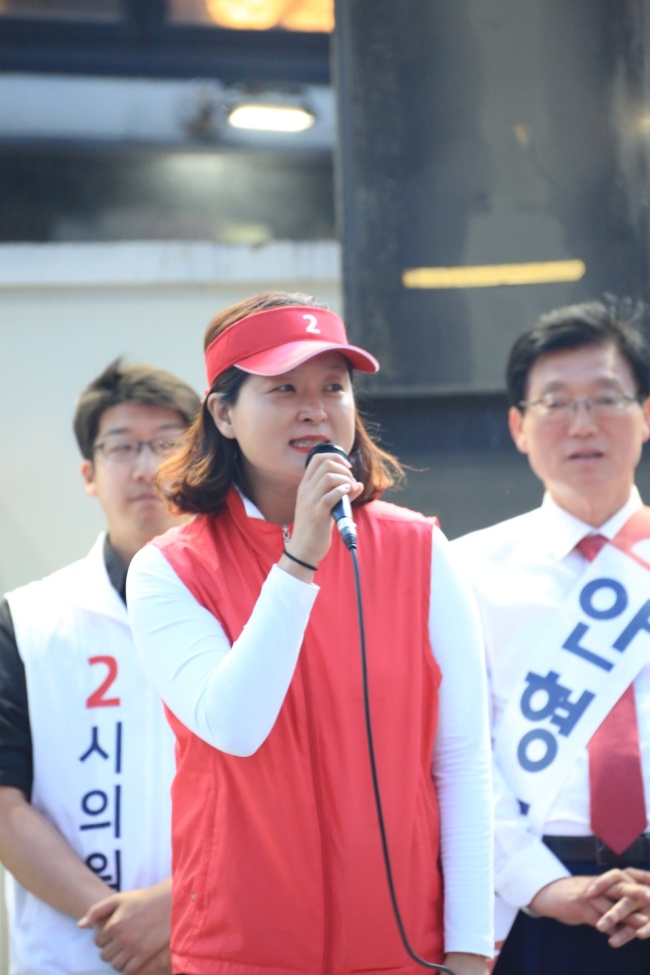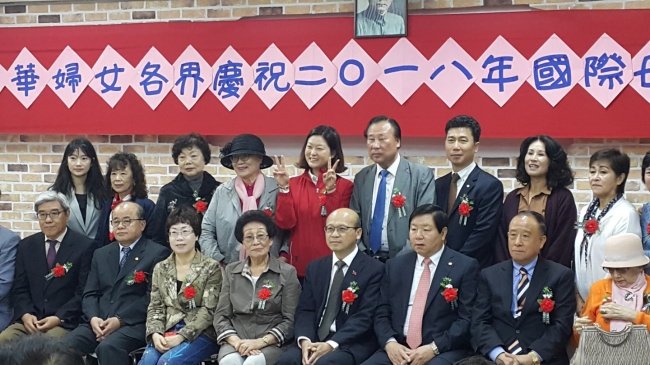During her childhood, Yang Li-ly had always felt she was deprived of something. Yang is a third-generation Hwagyo -- ethnic Chinese and Taiwanese living in Korea -- holding Korean citizenship. She was born to a Taiwanese mother and a Korean father.
“I was born and brought up in Korea, and I am Korean. But I was always confused in my teen years, and I could not be proud of my root as a Hwagyo, because the foreign background is alien to the Korean society,” Yang, 41, said in an interview with The Korea Herald on Tuesday. “Back in the ’90s, anything foreign was unusual and it was perceived as a difference, not necessarily in a good way. The social perception of other ethnicities has changed much since then, but more can be improved.”
 |
(Courtesy of Yang Li-ly) |
In the upcoming June 13 local elections, Yang has been nominated as the main opposition Liberty Korea Party’s first proportional representative for Seodaemun District Council in Seoul. She seeks to be a communication channel between the approximately 30,000 Hwagyo population and Koreans. As for her Seodaemun district, there are about 10,000 citizens of Hwagyo origins.
“After all these years, the ethnic Chinese started to come here 130 years ago, I am the first one from a Hwagyo family to be nominated as a candidate in politics,” Yang said.
Her family is categorized as a “damunhwa” or multicultural household because she married a Hwagyo man, and her two daughters, who hold both Korean and Taiwanese citizenships for now, will have to decide on their citizenship before they turn 22.
Even though Yang has no problem with the Korean language and knows the culture, she has always thought of herself as a minority because she knew about society’s discriminations against people with foreign backgrounds -- especially from countries that were less well off than Korea. The problem was compounded by the fact that her mother, a polio victim, has difficulties walking.
She still remembers the time she lied about her mother’s nationality because she was embarrassed. One day, she brought her friends to her house and ringing the doorbell, she called “mama,” mother in Chinese, rather than using the Korean word, “eomma.” Her friends asked her why she would call her mother that way, and Yang told them that her mother had lived a long time in the United States.
While the 41-year old candidate has never thought of pursuing a political career, she has worked a civic activist in the city.
A booklover, she established the “Seodaemun Library Friends,” a civic organization in the Seodaemun Public Library. Yang also stood up to preserve a 61-year-old bookstore, Hongikmungo, located in Sinchon, Seoul when it was threatened with closure. Yang served as the director of Center for Freedom of Information and Transparent Society and also worked for a minority rights group.
“It was only in March that I joined the Liberty Korea Party. I only accepted the party’s recommendation because it was a proportional representative that can speak on minority issues,” Yang said. “I wanted to tell the world that, people with foreign backgrounds, or people with disabilities, can live as fully, and confidently in Korea as its members.”
 |
(Courtesy of Yang Li-ly) |
“Hwagyo families, we pay our taxes, we abide by the Korean laws. And these families have been rooted here for years. But there are small administrative changes that would make life much more convenient for us, and I want to lead those changes.”
For example, Hwagyos have to visit the community center to receive their basic personal documents such as family certificates, when Koreans could easily print them out online.
Her husband, who was born to a Korean mother and a Taiwanese father and brought up Korean, could not be get a bank loan because he is a Taiwanese.
Hwang, who studied psychology counseling in graduate school and wrote her thesis on ego of Hwagyo teenagers, wants to give courage to young Hwagyo students to dream about their future, and be confident about their roots.
“If living conditions for foreign expats and migrants are good, it means the living conditions for Koreans are better. I want to be the mediator who can lead that change,” she said.
By Jo He-rim (
herim@heraldcorp.com)






![[KH Explains] For Korean automakers, Chinese EVs may loom larger than Trump’s tariffs](http://res.heraldm.com/phpwas/restmb_idxmake.php?idx=644&simg=/content/image/2024/11/14/20241114050537_0.jpg)
![[Graphic News] Tainan predicted top destination for South Koreans in 2025](http://res.heraldm.com/phpwas/restmb_idxmake.php?idx=644&simg=/content/image/2024/11/13/20241113050807_0.gif)

![[Herald Review] Cho Seung-woo takes 'Hamlet' crown](http://res.heraldm.com/phpwas/restmb_idxmake.php?idx=644&simg=/content/image/2024/11/14/20241114050593_0.jpg)